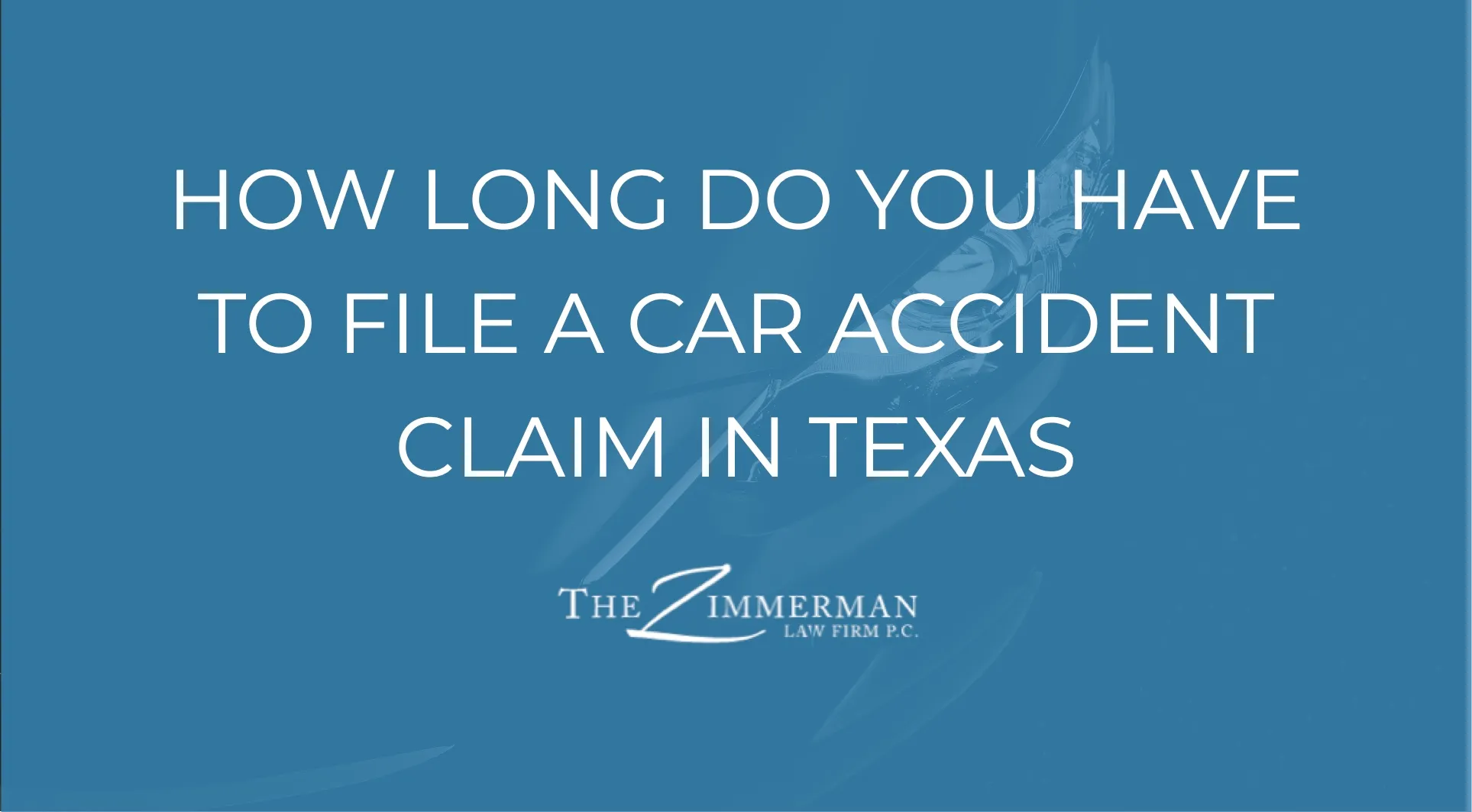 Car Accidents
Car AccidentsHow long do you have to file a car insurance claim in Texas after an accident? That depends on the identity of the at-fault driver.
If a driver hits you while performing government work, you have six months to notify the government of your claim. If the at-fault driver is a civilian, you have two years to sue for personal injury.
Regardless of the identity of the at-fault driver, you should start a lawsuit or a claim early to protect your rights.
When it comes to a car accident claim, Texas has many deadlines and timelines that close soon after your injury.
An experienced Waco car accident attorney at The Zimmerman Law Firm can meet your deadlines and put you in the best position to win all you deserve in your case.
Call our office today at 254-752-9688 or send us an online message to request your free consultation.
You Must Report Accidents that Caused Injury or Vehicle Damage Immediately
If you don’t report an accident within 24 hours, you might be breaking the law. This can result in fines or other penalties, depending on your location.
If you are contemplating filing suit for a car accident, you likely suffered physical injury and/or serious damage to your car.
If you suffered bodily injury or damage to your car that is so severe that your car is inoperable, Texas law requires you to report your accident to the police immediately.
If the accident caused personal injury or damage worth at least $1,000, an officer must file a report quickly.
The officer must file their written report with the Department of Motor Vehicles within 10 days of the accident.
These reports can also be helpful for any claim you make with the at-fault driver’s insurance or your own insurance.
Immediately after the accident, you should exchange information with the other driver, take pictures, collect names and contact information for any witnesses, and seek medical attention.
You should also make a claim on an at-fault driver’s insurance policy as soon as possible.
Having this information and making a claim as soon as possible keeps the events fresh and accurate in everyone’s minds.
A detailed and accurate account of the events can help you obtain a more favorable outcome in your case.
Pay Immediately for the Medical Care or Car Repairs You Need
You may not be at fault for the car accident, but you should not wait for the at-fault driver to pay your bills upfront.
While a lawsuit against an at-fault driver could be your best option for maximum recovery, it could take a while to recover your damages at trial.
Paying for repairs and care immediately is good for the health of your body, finances, and case.
You Could Receive Payment from Your Insurance Company Within One Month
For your immediate needs, you can quickly make a claim on your own insurance’s personal injury protection (PIP) policy.
Your Texas auto insurance policy must include PIP coverage unless you opt out of the coverage in writing.
When you make a claim on your own insurance, Texas law requires your insurance company to review your claim and respond quickly.
Typically, you should promptly report a car accident to your insurance provider in Texas. Most policies allow a window of around 30 days for filing a claim, but it’s essential to consult your insurance documentation for the precise deadline. Each policy may have different requirements.
Your insurance has an additional 15 days to accept or deny your claim and five days after approval to pay.
Sometimes your insurance company can extend this deadline by 45 days if it notifies you with a reason. You can collect 18% annual interest and attorney fees for any other delays in payment.
Filing Your Claim Immediately Establishes Adequate Damages
Filing your claim immediately increases the likelihood that you receive payment earlier and the likelihood that you receive adequate damages.
Your damages should cover your medical care, lost wages, repair, or replacement of property, and pain and suffering.
If your insurance or the at-fault driver’s insurance pays for medical care immediately, you can receive regular, monitored care early. Regular care can produce multiple reports explaining your medical needs.
Reports explaining your present and future medical needs are important evidence to prove your economic damages at trial. These reports are also useful in settlement negotiations.
The longer you wait to file a claim, the higher the likelihood that you could suffer a subsequent, unrelated injury.
The at-fault driver’s insurance wants to find ways to argue that your injuries are not related to your accident.
Even if your symptoms stem from the accident, insurance companies use subsequent “intervening injuries” to argue that the at-fault driver didn’t cause your damages and isn’t liable.
You should present to the insurance company evidence of your injuries’ connection to the accident and your treatment early.
This makes your damages harder to deny. Making your claim and presenting evidence early might also inspire the insurance company to settle with you fairly and quickly.
Contact a Waco Car Accident Lawyer Today
How long do you have to file a car insurance claim in Texas after an accident? You should know that the answer is not long.
You should call a Waco car accident lawyer immediately to make the most of your time and maximize your damages.
The Texas personal injury attorneys at The Zimmerman Law Firm, have 85 years of combined experience.
We strive to improve the lives of Central Texans with our legal expertise, and we want to help you. Contact us online or by phone at 254-752-9688 for a consultation.
